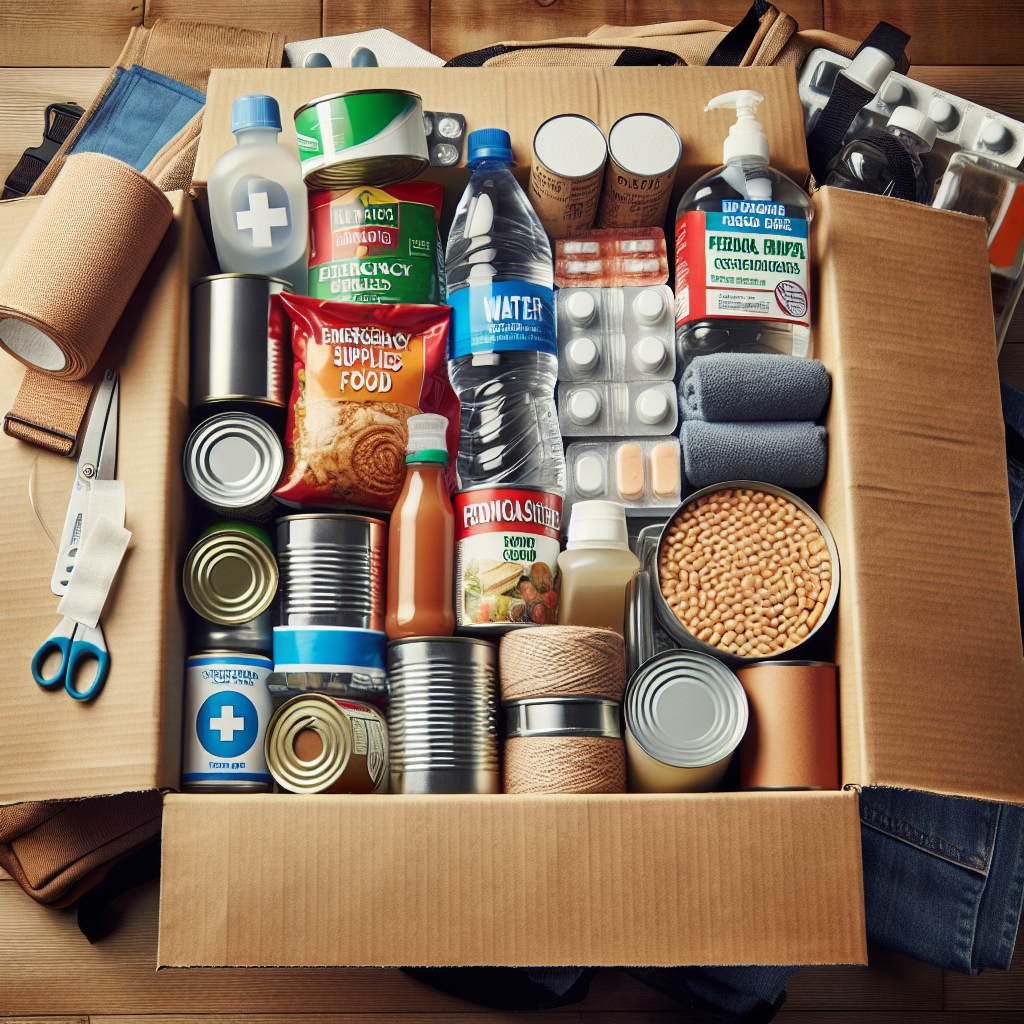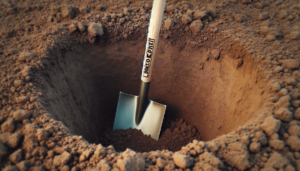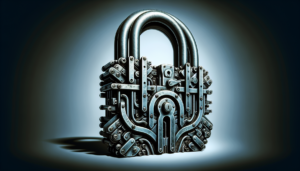
In an ever-changing world, the looming possibility of an extended economic collapse or societal breakdown raises important questions about readiness and preparation. As uncertainty surrounds us, it becomes imperative to assess our level of preparedness for such unforeseen events. By acknowledging potential risks and taking proactive steps, you can ensure your personal resilience and better navigate these challenging times. This article aims to provide valuable insights and practical tips on how you can effectively prepare yourself for the uncertainties of an extended economic collapse or societal breakdown.
Developing a Survival Mindset
Understand the potential risks and challenges
In order to prepare for an extended economic collapse or societal breakdown, it is crucial to first understand the potential risks and challenges that may arise. This involves conducting thorough research and staying informed about current events, political situations, and economic trends. By being aware of the possible scenarios that could unfold, you can better anticipate and plan for the challenges that may come your way.
Adopt a proactive attitude
Having a proactive attitude is essential in preparing for an extended economic collapse or societal breakdown. Instead of waiting for things to happen, take initiative and start making preparations. This includes taking steps to ensure your safety, securing basic necessities, and building resilience in various aspects of your life. By taking a proactive approach, you are better equipped to face any challenges that may arise.
Educate yourself about survival skills
In order to survive during an extended economic collapse or societal breakdown, it is important to educate yourself about essential survival skills. This includes learning how to find and purify water, start a fire, build a shelter, and navigate in the wilderness. Additionally, acquiring skills such as first aid, self-defense, and basic medical knowledge can be invaluable in times of crisis. Take the time to educate yourself and practice these skills to enhance your chances of survival.
Build mental resilience
The psychological toll of an extended economic collapse or societal breakdown can be significant. It is important to build mental resilience in order to stay calm and focused during challenging times. Engage in activities that promote mental and emotional well-being, such as meditation, journaling, and maintaining a support network. Developing a positive mindset and being adaptable to change is key to maintaining mental resilience in the face of adversity.
Securing Basic Necessities
Stockpile essential supplies
One of the first steps in preparing for an extended economic collapse or societal breakdown is to stockpile essential supplies. This includes non-perishable food items, clean drinking water, medical supplies, hygiene products, and other necessities. Aim to have a stockpile that can sustain you and your family for an extended period of time, considering factors such as the number of people in your household and any specific dietary or medical needs.
Learn to grow and preserve food
In a situation where access to fresh food may be limited, learning how to grow and preserve your own food can be crucial. Start by acquiring basic gardening skills, such as understanding soil composition, planting seeds, and maintaining a garden. Additionally, learn different methods of food preservation, such as canning, drying, and fermenting, to ensure a sustainable source of food even during long-term disruptions in the food supply chain.
Develop alternative water sources
Access to clean water is a fundamental necessity for survival. In the event of an extended economic collapse or societal breakdown, it is important to have alternative water sources. This can include rainwater harvesting systems, water filtration systems, or access to nearby water bodies. Additionally, it is crucial to learn how to purify water to make it safe for drinking, as contaminated water can lead to various health issues.
Ensure access to necessary medications
If you or anyone in your household relies on medication for a chronic condition, it is important to ensure a steady supply in the event of an extended economic collapse or societal breakdown. Speak to your healthcare provider about obtaining an extra supply of necessary medications and consider learning basic first aid skills to manage minor health issues that may arise. Having a well-stocked first aid kit can also be valuable in times of crisis.
Establishing a Secure Shelter
Assess your current living situation
Assessing your current living situation is an important step in establishing a secure shelter. Evaluate the strengths and vulnerabilities of your existing home, such as its structural integrity, accessibility, and proximity to potential risks. Take note of any necessary repairs or improvements that need to be made to ensure your home can withstand potential disruptions.
Consider suitable relocation options
In some cases, it may be necessary to consider relocating to a more secure area in the event of an extended economic collapse or societal breakdown. Research and identify potential relocation options that align with your needs, such as areas with access to natural resources, a supportive community, and a lower risk of social unrest. Consider factors such as climate, availability of basic necessities, and proximity to essential services.
Fortify and secure your home
To establish a secure shelter, it is essential to fortify and secure your home. This can include reinforcing doors and windows, installing security systems, and improving the overall structural integrity of your property. Assess your home’s vulnerability to potential threats such as break-ins or natural disasters, and take necessary measures to enhance its security.
Explore off-grid living alternatives
In the event of a prolonged economic collapse or societal breakdown, exploring off-grid living alternatives can provide greater self-sufficiency and resilience. This can involve investing in renewable energy sources, such as solar panels or wind turbines, to reduce dependency on the grid. Additionally, consider alternative ways of managing waste, such as composting or building an off-grid sewage system. Research and implement sustainable living practices to enhance your self-sufficiency and reduce your reliance on external resources.
Building a Self-Sufficient Lifestyle
Learn or enhance your gardening skills
In a situation where food supply may be disrupted, learning or enhancing your gardening skills can help ensure a reliable source of fresh produce. Start by researching and acquiring essential gardening tools, understanding different planting techniques, and learning about crop rotation and pest management. Experiment with different types of plants and focus on growing crops that are well-suited to your climate and dietary needs.
Acquire livestock and learn animal husbandry
Raising livestock can provide a sustainable source of protein and other essential food items. Depending on your living situation and local regulations, consider acquiring livestock such as chickens, rabbits, or goats. Learn the basics of animal husbandry, including feeding, sheltering, and proper healthcare. This will enable you to maintain a self-sufficient lifestyle and reduce reliance on external food sources.
Develop hunting, fishing, and foraging abilities
Incorporating hunting, fishing, and foraging into your skill set can help supplement your food supply during an extended economic collapse or societal breakdown. Invest time in learning about local wildlife, fishing techniques, and edible plants in your area. It is important to gather knowledge on hunting and fishing regulations and practice ethical and sustainable methods.
Master basic DIY repair and maintenance
Developing basic DIY repair and maintenance skills is essential to maintain and repair essential items in the absence of professional services. Learn how to repair common household items, troubleshoot simple plumbing and electrical issues, and perform basic maintenance tasks on vehicles and equipment. Acquiring these skills can help you become more self-reliant and extend the lifespan of your possessions.
Ensuring Energy Independence
Invest in renewable energy sources
Investing in renewable energy sources is a crucial step towards ensuring energy independence. Consider installing solar panels or wind turbines to generate electricity for your household. Conduct an energy audit of your home to identify potential energy inefficiencies and make necessary improvements. By reducing reliance on traditional energy sources, you can ensure a more sustainable supply of power in the event of an extended economic collapse.
Stock up on fuel and learn efficient usage
In addition to renewable energy sources, it is important to stock up on fuel for backup energy generation. This can include gasoline, propane, or firewood, depending on the availability and suitability for your situation. Store fuel safely in appropriate containers and learn efficient usage techniques to maximize its effectiveness and lifespan.
Practice energy conservation techniques
Conserving energy is essential in ensuring long-term energy independence. Adopt energy-saving habits such as turning off lights when not in use, utilizing natural light and ventilation, and using energy-efficient appliances. Additionally, insulating your home and sealing any drafts can help retain heat or cool air, reducing the need for excessive energy consumption.
Explore alternative heating and cooking methods
During a societal breakdown, traditional heating and cooking methods may become unreliable. Explore alternative methods such as wood stoves, solar cookers, or rocket stoves that use minimal fuel. Learn how to safely operate these alternative devices and practice using them before they become necessary.
Developing a Reliable Communication System
Create a network of trusted individuals
Building a network of trusted individuals is crucial for effective communication during an extended economic collapse or societal breakdown. Identify like-minded individuals who share similar preparedness goals and values. Establish a communication plan with your network to ensure seamless communication and support in times of crisis.
Invest in reliable communication devices
Invest in reliable communication devices that can withstand disruptions in traditional communication networks. Consider investing in two-way radios, satellite phones, or long-range signal devices. Ensure you have spare batteries and familiarize yourself with the operation of these devices. Regularly test their functionality to identify any potential issues and make adjustments accordingly.
Establish encrypted communication channels
In a situation where privacy and security are paramount, establishing encrypted communication channels is essential. This can include using virtual private networks (VPNs), secure messaging apps, or encrypted email services. Protecting your communications from unauthorized access will help maintain confidentiality and mitigate risks of interception.
Master basic radio operation and protocol
Learning basic radio operation and protocol is crucial for effective communication in times of crisis. Familiarize yourself with common radio frequencies, channel assignment, and appropriate radio etiquette. Practice communicating with other radio users to ensure your ability to relay important information accurately and efficiently.
Enhancing Personal Security
Assess personal protection needs
Assessing personal protection needs is an important aspect of preparing for an extended economic collapse or societal breakdown. Consider the potential risks and vulnerabilities specific to your situation and take appropriate measures to enhance personal security. This may include securing your property, installing surveillance systems, or obtaining personal protective equipment.
Acquire self-defense skills and knowledge
Acquiring self-defense skills and knowledge is essential to protect yourself and your loved ones during a crisis. Enroll in self-defense courses or martial arts training to learn techniques for personal protection. Additionally, familiarize yourself with self-defense laws and regulations to ensure you act within legal boundaries.
Secure necessary firearms and ammunition
In some situations, owning firearms may be considered necessary for personal security during an extended economic collapse or societal breakdown. If you choose to own firearms, ensure you fully understand local laws and regulations, obtain proper training, and responsibly store and secure your firearms and ammunition. Regular maintenance and practice are crucial to maintain proficiency and ensure the safe and effective use of firearms.
Form or join a community for collective security
Forming or joining a community for collective security can provide additional protection during times of crisis. Collaborate with like-minded individuals in your area to establish a community watch program or neighborhood security measures. By working together, you can share resources, knowledge, and provide mutual support to enhance overall safety and security.
Preparing Financially
Diversify investments into tangible assets
In order to prepare for an extended economic collapse or societal breakdown, it is important to diversify your financial investments into tangible assets. Consider investing in precious metals, real estate, or other physical commodities that hold value during economic downturns. Diversifying your portfolio can help mitigate the risks of financial instability and provide alternative sources of wealth.
Set up emergency funds
Establishing emergency funds is crucial to withstand financial hardships during a societal breakdown. Aim to save an amount that can cover several months’ worth of living expenses. Keep these funds in a secure location and ensure they are easily accessible in case traditional banking systems become inaccessible.
Learn bartering and negotiation skills
In a situation where traditional currency may lose its value, learning bartering and negotiation skills can be invaluable. Invest time in understanding the value of different goods and services, and practice negotiation techniques to ensure fair trades. Developing these skills can enable you to acquire necessary resources and services even when traditional financial systems are disrupted.
Reduce or eliminate debt
Reducing or eliminating debt can be a critical step towards financial preparedness. In times of economic collapse, the burden of debt can place additional strain on your financial resources. Prioritize paying off high-interest debts and avoid taking on unnecessary loans or credit. By reducing your overall debt, you can increase your financial stability and flexibility in times of crisis.
Establishing Community Relationships
Build strong relationships with neighbors
Building strong relationships with neighbors is essential for establishing community resilience. Get to know your neighbors, organize neighborhood events or initiatives, and foster a sense of community. In times of crisis, a supportive network of neighbors can provide assistance, resources, and emotional support.
Form or join a community resilience group
Forming or joining a community resilience group can enhance your preparedness and provide a platform for sharing knowledge and resources. These groups can offer training sessions, organize disaster drills, and collaborate on community-wide initiatives. Building resilience collectively strengthens the entire community during times of crisis.
Organize regular meetings and training sessions
Organizing regular meetings and training sessions within your community can help keep everyone informed and prepared. Schedule regular gatherings to share updates, discuss relevant topics, and engage in training activities. Providing opportunities for learning and collaboration contributes to a stronger community and enhances overall preparedness.
Collaborate with local organizations and authorities
Collaborating with local organizations and authorities can further enhance community resilience. Reach out to local emergency management agencies, non-profit organizations, or community centers to explore collaborative efforts. By working together, you can share resources, exchange valuable information, and make a greater impact in preparing for and responding to a societal breakdown.
Maintaining Physical and Mental Well-Being
Prioritize regular exercise and healthy habits
Maintaining physical well-being is crucial during times of crisis. Prioritize regular exercise to keep your body strong and resilient. Incorporate activities such as walking, cycling, or strength training into your routine. Additionally, adopt healthy habits such as getting adequate sleep, eating a balanced diet, and managing stress effectively to support overall physical and mental wellness.
Learn basic first aid and medical skills
Learning basic first aid and medical skills is essential for providing immediate care during a societal breakdown. Sign up for first aid courses to learn essential life-saving techniques such as CPR, wound care, and treating common injuries. Acquire basic medical knowledge to address minor illnesses and conditions when access to professional healthcare may be limited.
Plan for psychological and emotional support
Preparing for an extended economic collapse or societal breakdown requires considering psychological and emotional well-being. Develop a plan for psychological support, including strategies for coping with stress, anxiety, and uncertainty. Establish a support network of trusted individuals with whom you can share concerns and seek emotional support when needed.
Practice stress management techniques
Stress management techniques are vital for maintaining psychological well-being during times of crisis. Explore various techniques such as meditation, deep breathing exercises, or journaling to help alleviate stress and anxiety. Prioritize self-care activities that contribute to relaxation and emotional balance.
By following these comprehensive guidelines and taking proactive steps, you can better prepare yourself and your loved ones for an extended economic collapse or societal breakdown. Remember that preparedness is an ongoing process, and it is important to regularly reassess and update your plans as the situation evolves.







